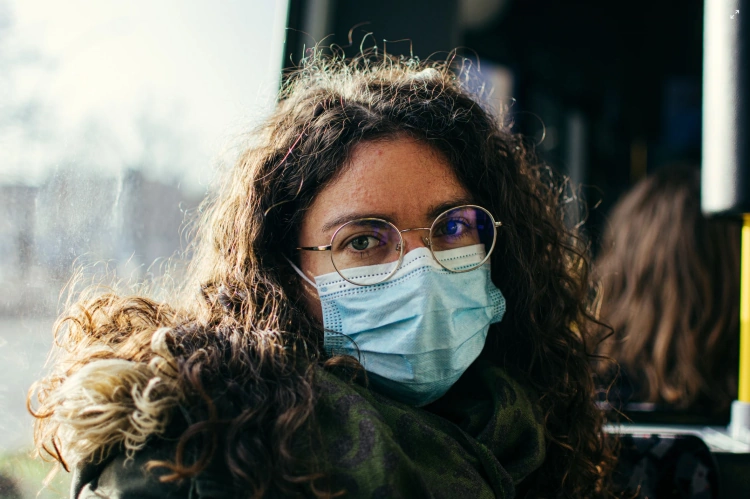How to stop your glasses from fogging up in the age of Covid
20 July 2021

Ever worn a face mask with your glasses on and suddenly felt blinded by fog? You’re not the only one…
Since the pandemic began in 2020, we’ve all collectively gotten used to wearing face masks at all times, given that it became a legal requirement to do so in public spaces. Covid restrictions may be easing up after July 19th, or ‘Freedom Day’, but many people will choose to continue wearing their face masks for the safety of both themselves and others.
One of the negative aspects of wearing a face mask, however, is that it can fog up your glasses which can obscure your vision – at best it can be irritating, and at worst it could even be dangerous depending on your activities (such as driving).
On the bright side, there are a few steps you can follow to stop this from happening. This will make sure you’ll never get bogged down with foggy glasses again!
Why do glasses fog up?
Before looking at how we can prevent our glasses from fogging up, let’s look at why it happens in the first place. The short answer is that glasses fog up because of condensation.
Condensation occurs on the lenses of eyeglasses when warm water vapour (such as your breath) lands on the cool surface of your lenses. Due to the temperature change, the water vapour then morphs into small drops of liquid, materialising into a layer that is seen as fog.
What prevents fogging of glasses?
To prevent your glasses from fogging up you need to stop condensation from forming on your lenses. Some of the actions you can take include:
- Using a nose clip: If you find that your glasses repeatedly fog up while wearing a face mask, chances are it’s probably because your mask doesn’t fit your face properly. One solution for this issue is investing in an adjustable nose clip. To use the nose clip you simply place it on the bridge of your nose once you have your mask on, and then pinch it to secure the clip and keep your mask in place. A tightly-fitted mask will stop any condensation from forming on your lenses.
- Washing your glasses with soap: Washing the lenses of your glasses with either washing up liquid or soap can create a protective barrier on your lenses which can also stop condensation from happening. As a small number of soap molecules will remain on the lenses after they are washed, this makes a transparent coating that can inhibit the formation of fog.
- Tucking in your mask: If your mask doesn’t fit your face tightly and is too loose, warm air is likely to escape and fog up your lenses. A top tip to avoid this is to move your glasses further down your nose to increase the airflow in between. Alternatively, you could wear your mask a little higher and place your glasses on top of your mask. The weight of your glasses will stop any air from escaping and reaching your lenses.
- Securing your mask with skin-safe tape: For those of you who don’t have sensitive skin, you could potentially use a strip of skin-safe tape to secure your mask and keep it in place, all while avoiding excessive skin irritation and discomfort. This will seal the top of your mask and prevent your lenses from misting up. Take care with this method, however, as any type of tape can still potentially harm the skin around your eyes.
Can I put anti-fog on glasses?
If you’ve cleaned your lenses, tried all of the tips above, and still suffer from foggy glasses, then you could try using an anti-fog lens wipe or spray. Anti-fog wipes and sprays are specifically designed to repel condensation from your lenses to help prevent them from steaming up. This is because they form a hydrophobic coating on the lenses, which repels moisture and condensation. A study carried out to test anti-fog used on glasses in medical settings during the pandemic shows it was used successfully – so rest assured that this method does work and is also safe to use!
Will anti-fog spray ruin my glasses?
Not every anti-fog spray is made of the same material. Some lenses could be damaged, stained, or eroded by the chemicals in certain anti-fog spray formulas. To reduce the risk of injury from the chemicals in certain anti-fog sprays, make sure you check the product description so you know which materials the spray can be used on safely. In particular, anti-fog sprays that are meant for use on plastic should not be used on lenses.
How do you make an anti-fog solution for glasses?
If you don’t fancy spending money on anti-fog spray, you could always make your own at home! The first step is to clean your glasses and make sure they’re dry and free of any streaks. All you need to make a homemade anti-fog solution is to mix white vinegar and hot water. This solution is a much cheaper alternative to the anti-fog sprays available for purchase on the market and works just as well.
And there you have it! All the tips and tricks you need to keep your glasses fog-free, whether you choose to continue wearing your mask after ‘Freedom Day’ or not.
If you’d rather save yourself the trouble, however, simply ditch the glasses instead – book a FREE Consultation with Ultralase today!
Back to Blog
